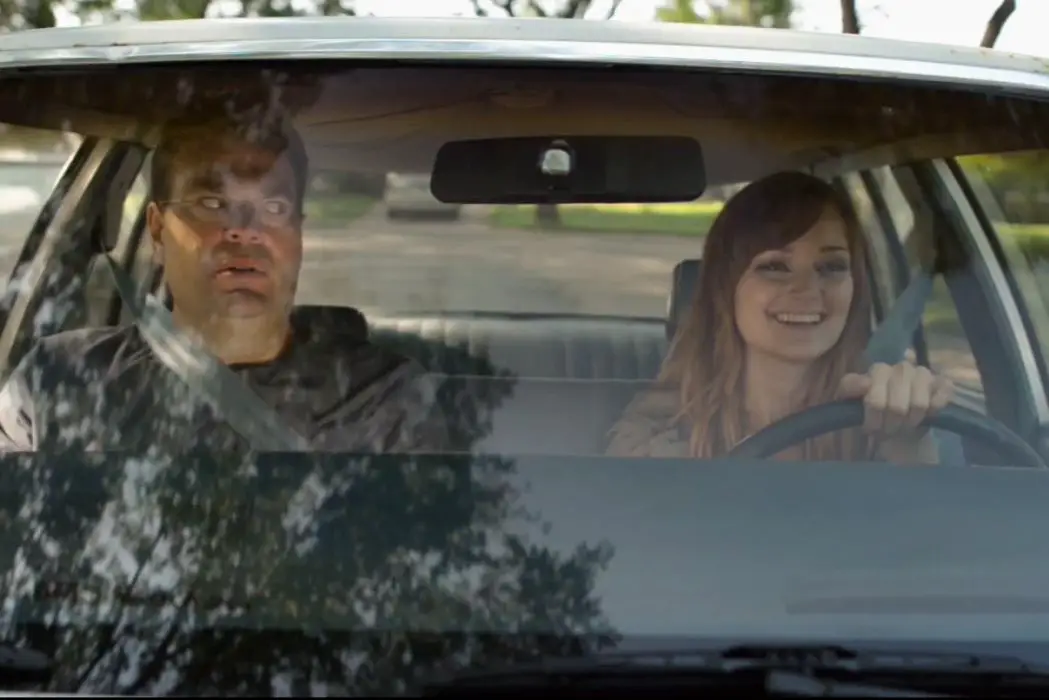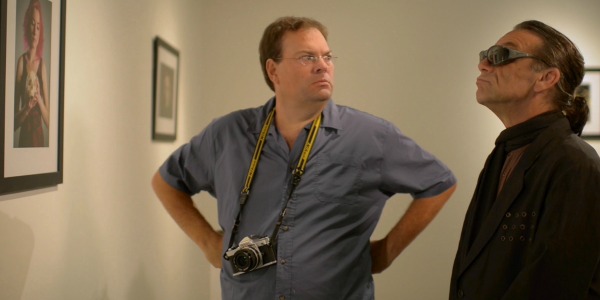THE SABBATICAL: Whittingham’s Ode To Art & Self-Preservation

Alex Arabian is a freelance film journalist and filmmaker. His…
All too often do singular talents evade the entertainment industry. Some entertainers never get their due, many get it far later in life than somebody of their talent level deserves. At the age of 51, James Whittingham of the award winning The James And Kevin Show gets his shot at the silver screen with The Sabbatical. Ten minutes into viewing, I realized I was witnessing a special, rarity of a performance.
Whittingham, also a co-writer along with director Brian Stockton and story developers, Ian Schneider and Matthew Yim, is effortlessly natural in front of the camera. He represents the everyman archetype in perhaps the most realistic and relatable way. His remarkable, nuanced performance is matched by Laura Abramsen’s free-spirited, youthful energy.
The Sabbatical isn’t your typical midlife crisis film. Aside from the fact that a sizable amount of the dialogue was improvised, it is highly unpredictable in the best sense of the word. It continually apprehends the audience’s conditioned preconceptions of narrative inclinations construed by recycled mainstream material. At 82 minutes, The Sabbatical is a small but tasty bite of indie cinema. Shot on an estimated budget of just over $96,00o U.S. dollars, its micro-budget doesn’t once get in the way of the story, thanks to the wonderful talent involved both onscreen and behind the scenes.
Welcome Back, James Whittingham
Whittingham isn’t a conventional leading man. He hasn’t gotten by in the industry based on looks, pedigree, or traditional Hollywood charm. His innate, unforced charisma has carried Whittingham to The Sabbatical, which serves as an ideal vehicle for his unconventionally engaging personality. His reactions to uncomfortable and unwarranted situations are, at times, laugh-out-loud funny. Costume designer Adrienne Adams does a wonderful job of adding to Whittingham’s awkward character with painfully outdated style, oversized Tommy Bahama-esque button-downs, ’90s-era sweaters, dated pants with tennis-shoes and all.

As photography professor, James, Whittingham’s character’s observations astutely capture the essence of the diminishing value of celluloid film to the millennial generation. His students are uninterested, every device in this day and age has a miniature digital camera that mostly gets used for selfies and pictures of food and pets; photography as he knows it is obsolete. His view is cynical albeit accurate. And so emerges a precious subtext in The Sabbatical.
Preservationism and Human Nature
There is a growing population in the youth of today’s generation that longs for the irretrievability of the past. Susan Sontag put it the best in her collection of essays, On Photography, noting that a melancholiness inhabits a still photograph because it is unreachable. It is an apt metaphor for James’s journey into rediscovering his sense of self by looking into the past.
It is also through this metaphor in The Sabbatical’s story that James connects with one of the few of his generational successors to appreciate still photography. Lucy, played exceptionally by Abramsen, is a fresh take on the free-spirited youth character archetype. In the darkroom, Lucy and James bond over the photochemical process, figuratively and literally capturing moments of the past.

Due to recent dizzy-spells, James is prohibited by his neurologist from driving. Lucy, whom he meets at a photography exhibit after discovering she has Stendhal Syndrome, becomes his personal driver-turned emotional support through his midlife rut. James is drawn to her fresh perspective as well as her love for the past (not many millennials still know who David Frank is). On his sabbatical, he is faced with an ultimatum, create another masterpiece on par with his fictional, The Americans-esque photography book, “Streets”, or get laid-off upon his return from leave.
“When you take someone’s picture, you’re sucking their energy, you’re stealing their soul right out of their eyes,” proclaims Lucy at one point in the film. Indeed, photographs and moving pictures can capture that which is intangible, the essence of a person’s being. In that sense, subconsciously, we’ve all experienced Stendhal Syndrome with at least one work of art through one medium or another.
Defies Convention While Avoiding Pretentiousness
Balancing on the tightrope of convention and pretentiousness is a difficult line to successfully walk. The braintrust behind The Sabbatical pulls it off by not conforming the story to traditional subgenres. It transcends ” train-wreck midlife crisis,” “forbidden love,” “romantic comedy,” and “relationship drama” tropes. When the viewer thinks The Sabbatical is heading in one direction, the story diverts their assumptions.
The Sabbatical also avoids falling victim to becoming too preachy or appearing all-knowing. When the subject matter deals with one generation’s commentary of another’s, it is easy to come off as bitter, biased, and narratively repetitive (i.e. “This damn generation has lost its morals. What happened to the good old days? Etc.”). However, rather than finding differences, The Sabbatical‘s story zeroes in on what James and Lucy’s generations have in common. Sure, millennials are spoiled with the efficiencies that technology has created. However, technology has isolated the millennials and generation Y’s more than it has any other generation.

Because of technological isolationism today, it is as common to find young adults in quarter-life crises as it is to see the traditional middle-aged, midlife crises. Lucy’s quarter-life crisis is as integral to the story as James’s downward odyssey is. They are both lost in generational translation together, two old souls confined by the ageing vessels of their bodies, just as the essence of a still photograph is, its colors fading with age. Lucy and James’s relationship hits the inevitable point of confrontation: plutonic, romantic, or just passing by?
Another Canadian Success
The Sabbatical is a coming-of-age story without children. Instead, it’s about adults, trapped in arrested development, perpetuated by the monotonous continuity that unhealthy daily routines can succumb to. Backed by Telefilm Canada, The Sabbatical makes another compelling case for the importance of government funding of the arts (hint, hint, America).
Canada has helped independent filmmakers make compelling films on micro-budgets for decades. One of the best examples of their commitment to the arts today can be seen through the work of director Bruce McDonald, whose films succeed at telling original stories with rich content, in-part due to the fact that Canada promotes and financially perpetuates the arts, and, subsequently, art preservation.
Stockton and Whittingham’s The Sabbatical is no different. Shot on a budget of $125,000 Canadian dollars, it puts most films that have the benefit of seven-digit financial liberties to shame. Budget is never an issue thanks to Stockton’s unique directorial style and his and Whittingham’s witty script.
Stockton lets his cast improvise as much as they want, and, with actors as talented as Abramsen and Whittingham, it works to everyone’s advantage. The Sabbatical exemplifies the power of good storytelling over spectacle cinema. Its midlife crisis premise fuels Whittingham’s intangible art and isolationism allegories and societal observations, cleverly interweaving a paradoxical undertone of the dwindling supply of human contact and connection during a time when its demand is likely at an all time high in human history.
If viewers aren’t reinvigorated by a love for the arts after viewing The Sabbatical, at the very least, they will be reminded to absorb more of their surroundings, observe the seemingly banal moments with a slightly more practiced eye the next time they decide to take a walk outside. Life is fleeting, and time is unreliable and deceiving. You never know how long (or short) that walk may be. Enjoy it.
Did you relate to any of The Sabbatical’s themes? Is there an aspect of the past that you think deserves to be preserved?
The Sabbatical will be released on VOD on 13 July, 2017.
Does content like this matter to you?
Become a Member and support film journalism. Unlock access to all of Film Inquiry`s great articles. Join a community of like-minded readers who are passionate about cinema - get access to our private members Network, give back to independent filmmakers, and more.
Alex Arabian is a freelance film journalist and filmmaker. His work has been featured in the San Francisco Examiner, The Playlist, Awards Circuit, and Pop Matters. His favorite film is Edward Scissorhands. Check out more of his work on makingacinephile.com!













